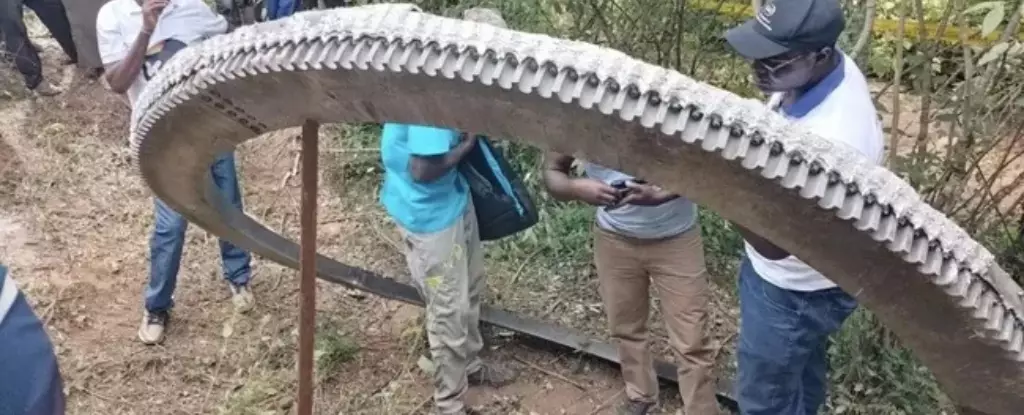On a seemingly ordinary Wednesday afternoon, the tranquility of Mukuku Village in Kenya was abruptly disrupted by an unforeseen event. At approximately 3 p.m. local time, a metallic object, weighing around 1,100 pounds and stretching eight feet in diameter, descended from the cosmos and crash-landed in the village. The unexpected visit from this celestial fragment drew immediate attention from the Kenya Space Agency, which confirmed the incident and alleviated concerns by reporting that no injuries had occurred. This incident raises vital questions and concerns about the implications of space debris on our planet.
The metallic ring, described as potentially deriving from a rocket separation stage, prompts intriguing discussions regarding its origins. Major Alois Were of the Kenya Space Agency indicated that the team had already begun collecting fragments from the impact site to conduct a detailed analysis. However, the true source of such debris remains elusive, with officials scrambling to determine its lineage. The complexity of identifying space debris is compounded by the lack of a centralized registry for tracking all objects launched into orbit. The degradation of international space law regarding accountability for space debris poses a significant challenge in addressing incidents like that in Mukuku Village.
The response from the Kenya Space Agency hinted at potential accountability measures: once the origin of the ring is identified, they plan to invoke existing international legal frameworks to address the situation. This approach is essential, as the growing prevalence of debris in our planetary atmosphere not only threatens populated areas but also compromises the integrity of space operations themselves. The Mukuku incident serves as a stark reminder of the dangers associated with the exponential increase in objects being launched into space. With a notable rise in satellite launches and other space ventures, the risk of collision with space debris escalates, leading to an ongoing safety problem for both scientists and civilians.
The data is concerning; between 2008 and 2017, space agencies worldwide averaged 82 launches annually. This figure saw a marked increase to approximately 130 launches per year between 2018 and 2022, culminating in an unprecedented 250 launches in 2024 alone. The implications of such rampant expansion are severe. More objects in orbit increase the likelihood of debris generation, resulting in hazardous floating debris and potential collisions. Jonathan McDowell, a prominent astrophysicist, has articulated the gravity of this situation, underscoring the fatalistic nature of space debris accidents. While no casualties have been documented as a direct result of falling space debris to date, the risk remains alarmingly palpable.
The avalanche of space debris isn’t merely limited to larger fragments like that in Mukuku. The realm above Earth is now cluttered with a diverse array of discarded items—ranging from defunct satellites to astronaut equipment—and even small fragments no larger than a grape. Astrophysicist Thomas Berger poignantly expressed concern over the current trajectory of space debris management. With around 1,000 collision warnings issued daily, the potential for catastrophic chain reactions simulating ‘Kessler Syndrome’ is increasingly plausible. Such an event could render sectors of space inaccessible, crippling not only commercial ventures but also international scientific collaboration.
The Mukuku Village incident serves as a clarion call for humanity to reflect upon its burgeoning relationship with space and the responsibilities that accompany it. As the frequency of rocket launches accelerates, we must prioritize developing sustainable practices for managing space debris to prevent detrimental impacts on Earth and beyond. The skies should not only be a realm of wonder and exploration but also an environment that is respected and safeguarded for future generations. Ensuring that incidents like the one experienced in Mukuku Village are anomalies rather than precursors to a troubling trend must be at the forefront of space exploration policy and dialogue.


Leave a Reply